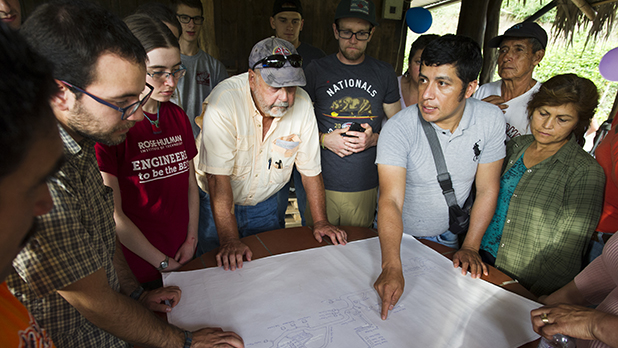Rose Chapter of Engineers Without Borders Works to Bring Clean Water to Community in Ecuador

Since late 2017, EWB-RHIT has been working on a project to bring clean drinking water to Chaguarloma, Ecuador. This community is in the northwest region of Quito and is home to around 40 families. Those individuals currently walk 3.5 kilometers (approximately two miles) each day just to get water.
When a person wants a glass of water in the United States, they can often just turn on the faucet and out pours clean, drinkable water. While most people do not think twice about this everyday task, the process of obtaining water is not so simple in other parts of the world. The Rose-Hulman chapter of Engineers Without Borders (EWB-RHIT) has worked to change that.
Engineers Without Borders is a multi-national organization dedicated to improving life for people living in developing countries through sustainable engineering projects. The goal of EWB-RHIT, which has approximately 20 active members, is to work closely with people of different regions to gain valuable engineering and cultural experience as they take on challenging projects.
Beginning late 2017, EWB-RHIT worked on a project to bring clean drinking water to Chaguarloma, Ecuador. This community is in the northwest region of Quito and is home to around 40 families. Those individuals currently walk 3.5 kilometers (approximately two miles) each day just to get water.
“We are fortunate to have access to clean water that goes through treatment plants and distribution centers,” says Jackie Renn, a previous EWB-RHIT member who recently graduated with a degree in civil engineering. “Everyone needs to have access to water to improve the quality of their life so they’re not spending the time walking two miles of their day getting water. This project will improve the general quality of life in the country as well.”
EWB-RHIT students were responsible for the initial design and construction of the gravity-fed, 8-kilometer water pipeline project, including the water disinfection and purification process. Students made three trips to Ecuador to work on the project. During the first trip in August 2018, students conducted a social survey to understand the community needs and conducted water testing. The second trip, which took place in February 2019, students conducted more survey data, especially near the roadway that would connect the water sources to the community. The last trip took place in March 2020, in which Renn was the surveying lead.
David Lincoln, a sophomore majoring in mechanical engineering, is a member of the student chapter. He believes working on this real-life EWB project provided him valuable experience beyond the classroom.
“It’s fascinating being able to work on a project that’s real,” says Lincoln. “A lot of what we do in class is theoretical, with paper and pencil. This project is helping real people. Even with whatever job I get after Rose, I’m not sure it will help people as much as what we’re doing here in Ecuador.”
Though the group has shifted its focus to other projects, Lincoln believes individuals in the United States who are fortunate to have clean water infrastructure should consider donating to other countries that do not have the same resources.
“When we have all the resources that we do in this country, it’s not really a choice to help others; it’s a necessity,” says Lincoln.